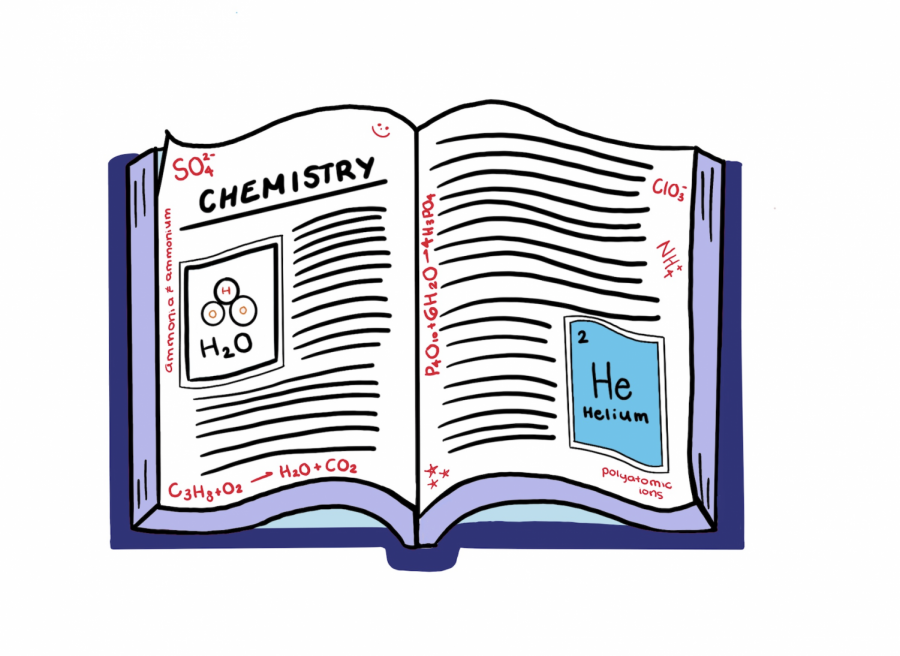Online Learning Creates New Opportunities for Cheating on Assessments
Distance learning has resulted in changes to how many Menlo teachers assess their students. More tests are now open note, meaning that students can refer to their class notes during assessments. Illustration courtesy of Sophie Fang.
December 8, 2020
As Menlo switched to an online learning program last spring, teachers had to quickly figure out how to transfer their in-person classes to an online format. While some elements of learning, such as lectures, could be easily conducted through Zoom, most other activities teachers previously used were not as adaptable. Particularly toward the beginning of online learning last year, teachers struggled with how to give assessments online.
As there is no one to proctor students at home to ensure they are not cheating, teachers who wanted to give traditional tests were forced to rely on the honor of their students. However, across the country, reports of students cheating on exams have risen amid online learning. In a recent study by Proctor U, the rate of students cheating on their tests during remote learning grew to 8% during the pandemic, compared to less than 1% before online learning began. Additionally, according to a Washington Post article, about 93% of instructors believe that their students are more likely to cheat online than in person.
One solution to combat cheating is to make assessments “open note.” Open note generally means that students are allowed to refer to any notes or textbook references they might have on the subject of their assessment. For the most part, this takes away the need for cheating because students are allowed to refer to their notes. The College Board opted to use this strategy in May with their AP exams, allowing students to refer to their notes and textbooks during the exam. However, because students can use material and notes, open note tests are often more difficult to assess the learning of a student.
All of the assessments biology teacher Tanya Buxton has given her students this year have been open note. She noted that the types of questions she asks on her tests have shifted more toward assessing critical thinking skills and have been less focused on memorizing facts. “I do think that the students are getting more out of it. […] There’s no reason to recall facts anymore,” Buxton said. During the fall hybrid schedule, she plans to not give any tests or assessments because she wants to focus on using the time for as much hands-on lab experience as possible. Buxton also said that she and the other biology teachers have lowered the percentage that tests and assessments make up of students’ final grades. Instead, labs are now counted as a greater percentage toward final grades.
Spanish teacher and World Language Department Chair Janet Tennyson has given her students three tests, a written exam and an oral exam this school year. While all of the assessments were closed note, she tried to create questions that would make it obvious if students were using outside sources or translators on the tests. “I prefaced [the test] with ‘I’m counting on you, I’m trusting you,’” Tennyson said. “And I think that the majority of students are not going to cheat.”
History teacher Abby Tieck takes a slightly different approach. She allows her students to use outside notes but also highly encourages them to refrain from doing so as she believes it is in their best interest in the long run. As Tieck teaches AP U.S. History, she designs her assessments around preparing her students for the AP exam at the end of the year. “I approach assessments with the idea that it is an opportunity for both the student and me to see where they are at that exact moment and for me to give both praise on their progress and some constructive feedback so they can keep improving,” Tieck said. Similarly, the biology teachers and the history department have decided to reduce the weight of summative assessments such as tests or quizzes and give more consideration to homework and classwork when creating final grades, according to Tieck and Buxton.
Freshman Charlie Hammond believes that cheating has likely increased during online school due to students taking advantage of the fact that they are not in the classroom. “I’m sure there are people who do [cheat], but I’d like to think that people are honorable on their word,” Hammond said.
Senior Emily Boal noted that on her open note assessments, she actually ended up studying more because the tests were designed to be complicated enough that a student could not find the answer in their notes.
Out of the students interviewed, the general consensus was that it is unfair to have closed note assessments during the hybrid schedule. “It’s really not fair for a teacher to be in the room, observing some people taking tests, [while] others just have a world at their hands and [can] use their notes if they want,” sophomore Sophie Leupold said.



